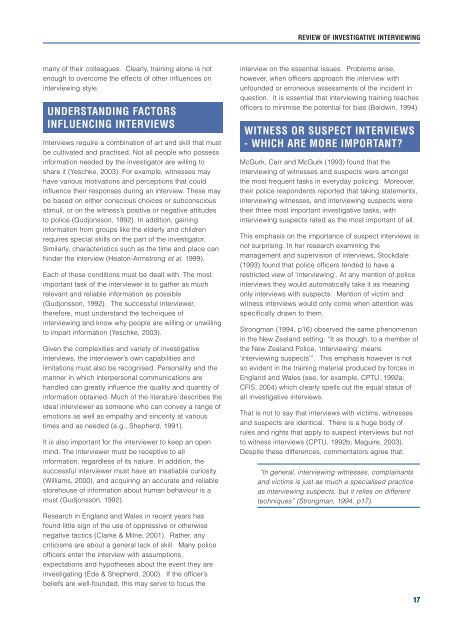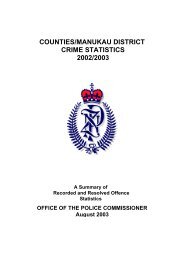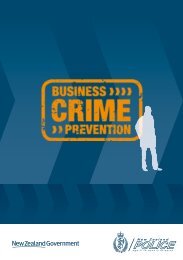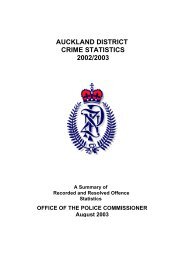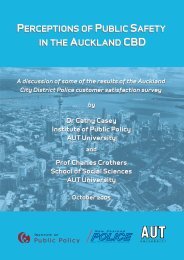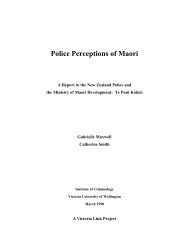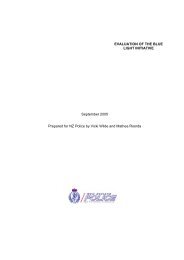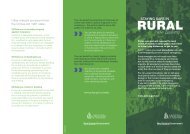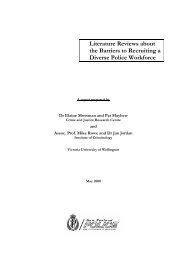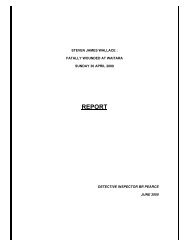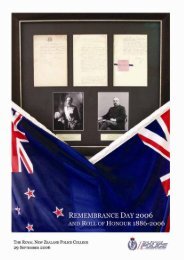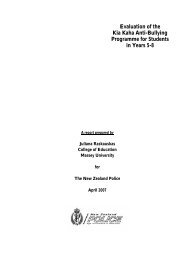Investigative interviewing: the literature - New Zealand Police
Investigative interviewing: the literature - New Zealand Police
Investigative interviewing: the literature - New Zealand Police
Create successful ePaper yourself
Turn your PDF publications into a flip-book with our unique Google optimized e-Paper software.
REVIEW OF INVESTIGATIVE INTERVIEWING<br />
many of <strong>the</strong>ir colleagues. Clearly, training alone is not<br />
enough to overcome <strong>the</strong> effects of o<strong>the</strong>r influences on<br />
<strong>interviewing</strong> style.<br />
UNDERSTANDING FACTORS<br />
INFLUENCING INTERVIEWS<br />
Interviews require a combination of art and skill that must<br />
be cultivated and practised. Not all people who possess<br />
information needed by <strong>the</strong> investigator are willing to<br />
share it (Yeschke, 2003). For example, witnesses may<br />
have various motivations and perceptions that could<br />
influence <strong>the</strong>ir responses during an interview. These may<br />
be based on ei<strong>the</strong>r conscious choices or subconscious<br />
stimuli, or on <strong>the</strong> witness’s positive or negative attitudes<br />
to police (Gudjonsson, 1992). In addition, gaining<br />
information from groups like <strong>the</strong> elderly and children<br />
requires special skills on <strong>the</strong> part of <strong>the</strong> investigator.<br />
Similarly, characteristics such as <strong>the</strong> time and place can<br />
hinder <strong>the</strong> interview (Heaton-Armstrong et al, 1999).<br />
Each of <strong>the</strong>se conditions must be dealt with. The most<br />
important task of <strong>the</strong> interviewer is to ga<strong>the</strong>r as much<br />
relevant and reliable information as possible<br />
(Gudjonsson, 1992). The successful interviewer,<br />
<strong>the</strong>refore, must understand <strong>the</strong> techniques of<br />
<strong>interviewing</strong> and know why people are willing or unwilling<br />
to impart information (Yeschke, 2003).<br />
Given <strong>the</strong> complexities and variety of investigative<br />
interviews, <strong>the</strong> interviewer’s own capabilities and<br />
limitations must also be recognised. Personality and <strong>the</strong><br />
manner in which interpersonal communications are<br />
handled can greatly influence <strong>the</strong> quality and quantity of<br />
information obtained. Much of <strong>the</strong> <strong>literature</strong> describes <strong>the</strong><br />
ideal interviewer as someone who can convey a range of<br />
emotions as well as empathy and sincerity at various<br />
times and as needed (e.g., Shepherd, 1991).<br />
It is also important for <strong>the</strong> interviewer to keep an open<br />
mind. The interviewer must be receptive to all<br />
information, regardless of its nature. In addition, <strong>the</strong><br />
successful interviewer must have an insatiable curiosity<br />
(Williams, 2000), and acquiring an accurate and reliable<br />
storehouse of information about human behaviour is a<br />
must (Gudjonsson, 1992).<br />
interview on <strong>the</strong> essential issues. Problems arise,<br />
however, when officers approach <strong>the</strong> interview with<br />
unfounded or erroneous assessments of <strong>the</strong> incident in<br />
question. It is essential that <strong>interviewing</strong> training teaches<br />
officers to minimise <strong>the</strong> potential for bias (Baldwin, 1994).<br />
WITNESS OR SUSPECT INTERVIEWS<br />
- WHICH ARE MORE IMPORTANT?<br />
McGurk, Carr and McGurk (1993) found that <strong>the</strong><br />
<strong>interviewing</strong> of witnesses and suspects were amongst<br />
<strong>the</strong> most frequent tasks in everyday policing. Moreover,<br />
<strong>the</strong>ir police respondents reported that taking statements,<br />
<strong>interviewing</strong> witnesses, and <strong>interviewing</strong> suspects were<br />
<strong>the</strong>ir three most important investigative tasks, with<br />
<strong>interviewing</strong> suspects rated as <strong>the</strong> most important of all.<br />
This emphasis on <strong>the</strong> importance of suspect interviews is<br />
not surprising. In her research examining <strong>the</strong><br />
management and supervision of interviews, Stockdale<br />
(1993) found that police officers tended to have a<br />
restricted view of ‘<strong>interviewing</strong>’. At any mention of police<br />
interviews <strong>the</strong>y would automatically take it as meaning<br />
only interviews with suspects. Mention of victim and<br />
witness interviews would only come when attention was<br />
specifically drawn to <strong>the</strong>m.<br />
Strongman (1994, p16) observed <strong>the</strong> same phenomenon<br />
in <strong>the</strong> <strong>New</strong> <strong>Zealand</strong> setting: “It as though, to a member of<br />
<strong>the</strong> <strong>New</strong> <strong>Zealand</strong> <strong>Police</strong>, ‘<strong>interviewing</strong>’ means<br />
‘<strong>interviewing</strong> suspects’”. This emphasis however is not<br />
so evident in <strong>the</strong> training material produced by forces in<br />
England and Wales (see, for example, CPTU, 1992a;<br />
CFIS, 2004) which clearly spells out <strong>the</strong> equal status of<br />
all investigative interviews.<br />
That is not to say that interviews with victims, witnesses<br />
and suspects are identical. There is a huge body of<br />
rules and rights that apply to suspect interviews but not<br />
to witness interviews (CPTU, 1992b; Maguire, 2003).<br />
Despite <strong>the</strong>se differences, commentators agree that:<br />
“In general, <strong>interviewing</strong> witnesses, complainants<br />
and victims is just as much a specialised practice<br />
as <strong>interviewing</strong> suspects, but it relies on different<br />
techniques” (Strongman, 1994, p17).<br />
Research in England and Wales in recent years has<br />
found little sign of <strong>the</strong> use of oppressive or o<strong>the</strong>rwise<br />
negative tactics (Clarke & Milne, 2001). Ra<strong>the</strong>r, any<br />
criticisms are about a general lack of skill. Many police<br />
officers enter <strong>the</strong> interview with assumptions,<br />
expectations and hypo<strong>the</strong>ses about <strong>the</strong> event <strong>the</strong>y are<br />
investigating (Ede & Shepherd, 2000). If <strong>the</strong> officer’s<br />
beliefs are well-founded, this may serve to focus <strong>the</strong><br />
17


